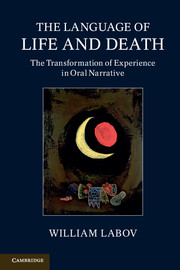Book contents
- Frontmatter
- Contents
- Preface
- Acknowledgments
- 1 Introduction to the language of life and death
- 2 Narrative analysis
- 3 The escalation of violence
- 4 Confrontations with death
- 5 Premonitions and communication with the dead
- 6 Margie Knott: “Her confrontation with the neighbors”
- 7 Gloria Stein: “They stoned the house”
- 8 Rose Norman: “The death of her younger sister”
- 9 Mary Costa: “The death of her youngest daughter”
- 10 Cache County
- 11 The vernacular origin of epic style
- 12 Historians' use of narrative
- 13 Thomas Babington Macaulay: “The death of Monmouth”
- 14 S. T. Bindoff: “The death of Elizabeth”
- 15 2 Samuel: “The death of Absalom”
- 16 The narrative view of death and life
- References
- Index
8 - Rose Norman: “The death of her younger sister”
Published online by Cambridge University Press: 05 June 2013
- Frontmatter
- Contents
- Preface
- Acknowledgments
- 1 Introduction to the language of life and death
- 2 Narrative analysis
- 3 The escalation of violence
- 4 Confrontations with death
- 5 Premonitions and communication with the dead
- 6 Margie Knott: “Her confrontation with the neighbors”
- 7 Gloria Stein: “They stoned the house”
- 8 Rose Norman: “The death of her younger sister”
- 9 Mary Costa: “The death of her youngest daughter”
- 10 Cache County
- 11 The vernacular origin of epic style
- 12 Historians' use of narrative
- 13 Thomas Babington Macaulay: “The death of Monmouth”
- 14 S. T. Bindoff: “The death of Elizabeth”
- 15 2 Samuel: “The death of Absalom”
- 16 The narrative view of death and life
- References
- Index
Summary
In the fall of 1978, a group of students in LING560 began a study of the Jewish community in South Philadelphia. This was not the stable neighborhood of the Irish, Italian or Polish communities, where three or four generations lived side by side. Most of the second or third generation Jews had moved out to the northeast or to Philadelphia suburbs, and the results of the study were focused on first-generation Jews whose first language was Yiddish. The interviews were strongly focused on the vibrant past of this community, and the period when every part of daily life was immersed in Jewish institutions and Jewish culture. One member of the group, Rakhmiel Peltz, went on to publish an ethnographic study of the South Philadelphia Jewish community (From Immigrant to Ethnic Culture: American Yiddish in South Philadelphia, 1998), which may provide us with background information for the epic narrative of this chapter.
In October of 1978, Ruth Sella interviewed Rose Norman, 69 years old, in her South Philadelphia home. Rose was eager to talk about the history of the neighborhood and its prominent families. One of these was the Bernstein family. An excerpt from her description will give an idea of the epic sweep of her didactic style, establishing names and places of the leading personnel to educate her audience on the most important facts.
and the father, Israel, lived at 242 Catherine Street, and was a very religious man. Oh my! He was one of the nicest, best people you're ever gonna learn. He said Kaddish for my father when he died, and for my sister, and we belonged to a corporation. This is also a very big thing in the life of Jewish people. There was an organization that they called a corporation. I don't know if you know what a corporation is
- Type
- Chapter
- Information
- The Language of Life and DeathThe Transformation of Experience in Oral Narrative, pp. 133 - 147Publisher: Cambridge University PressPrint publication year: 2013



